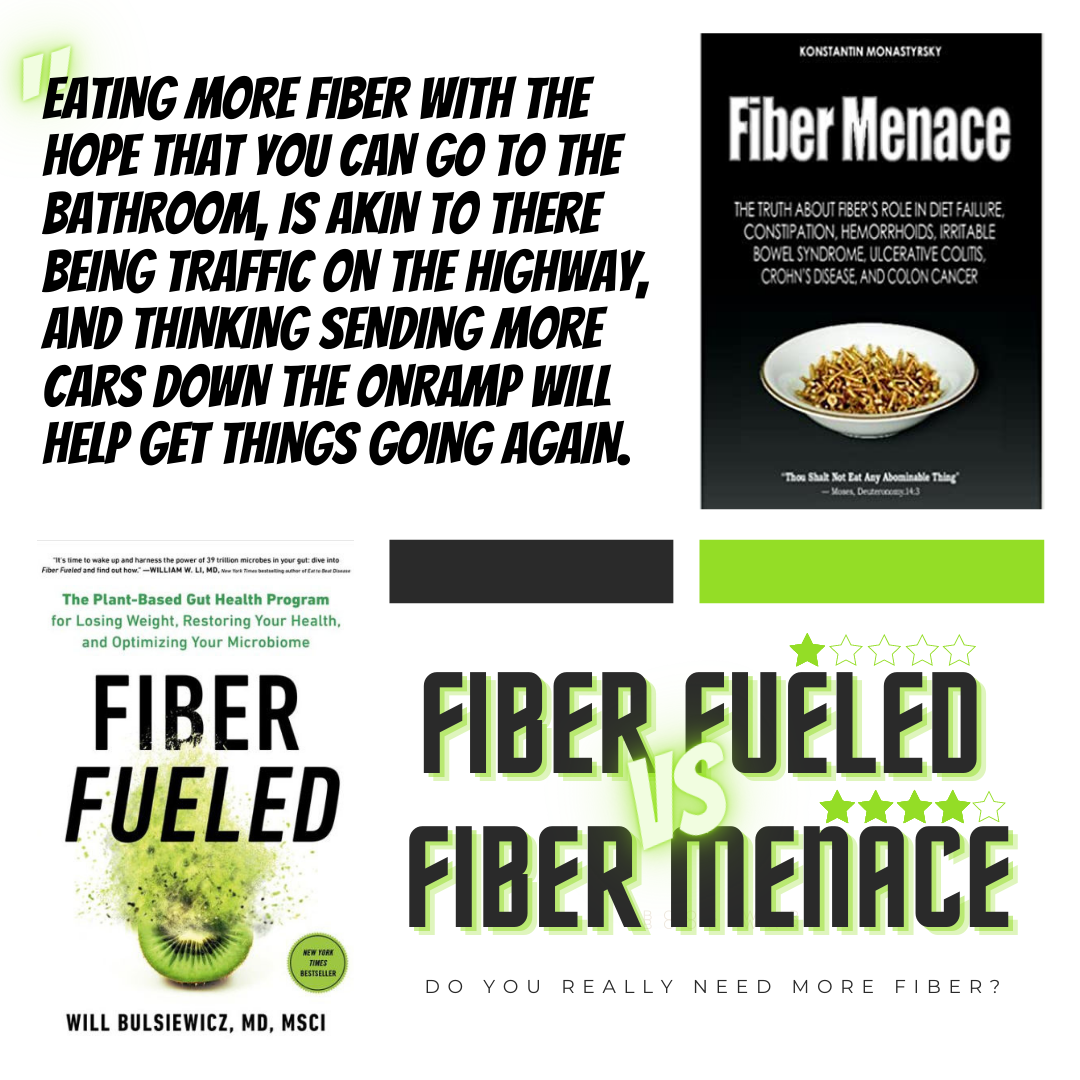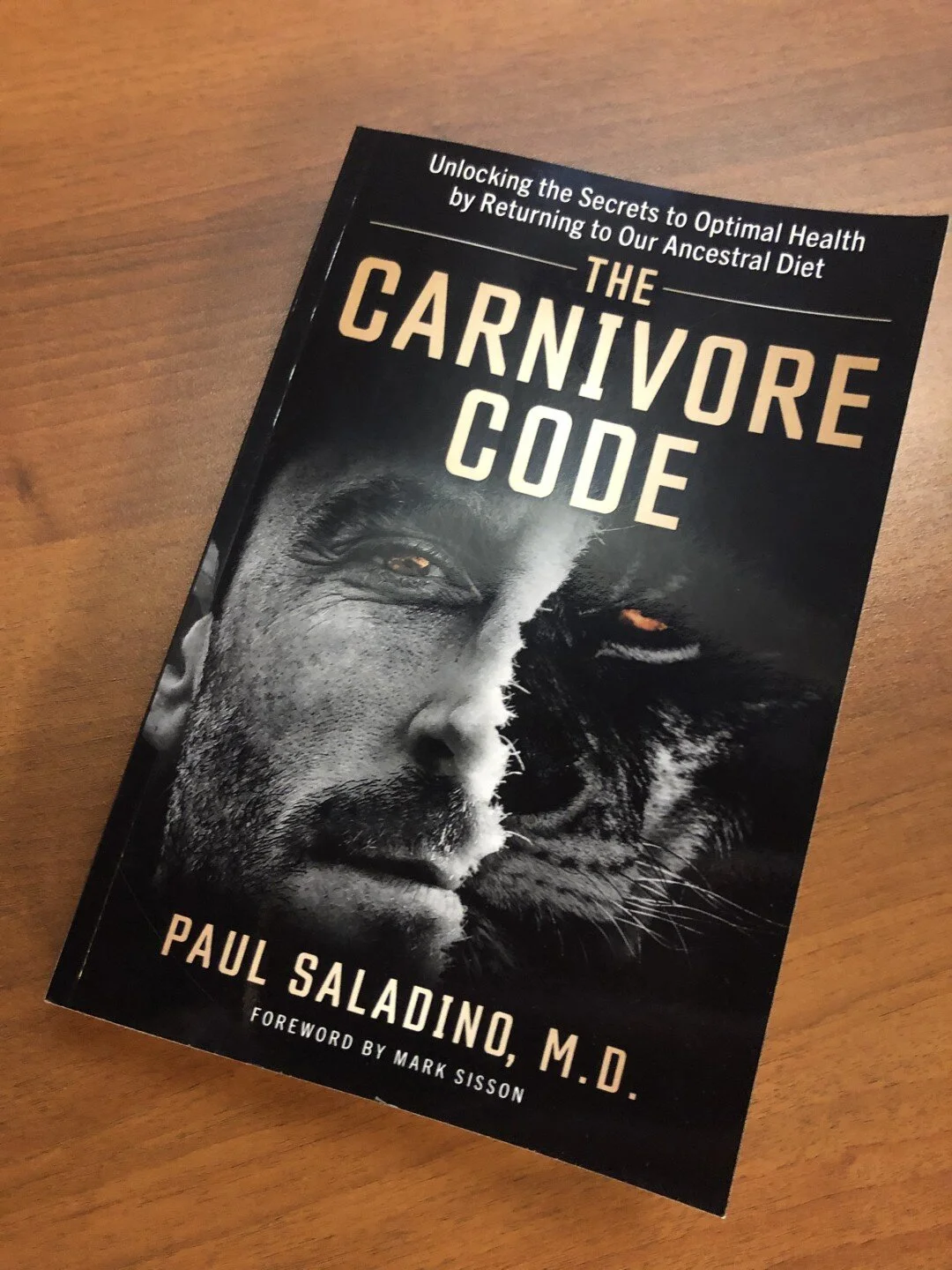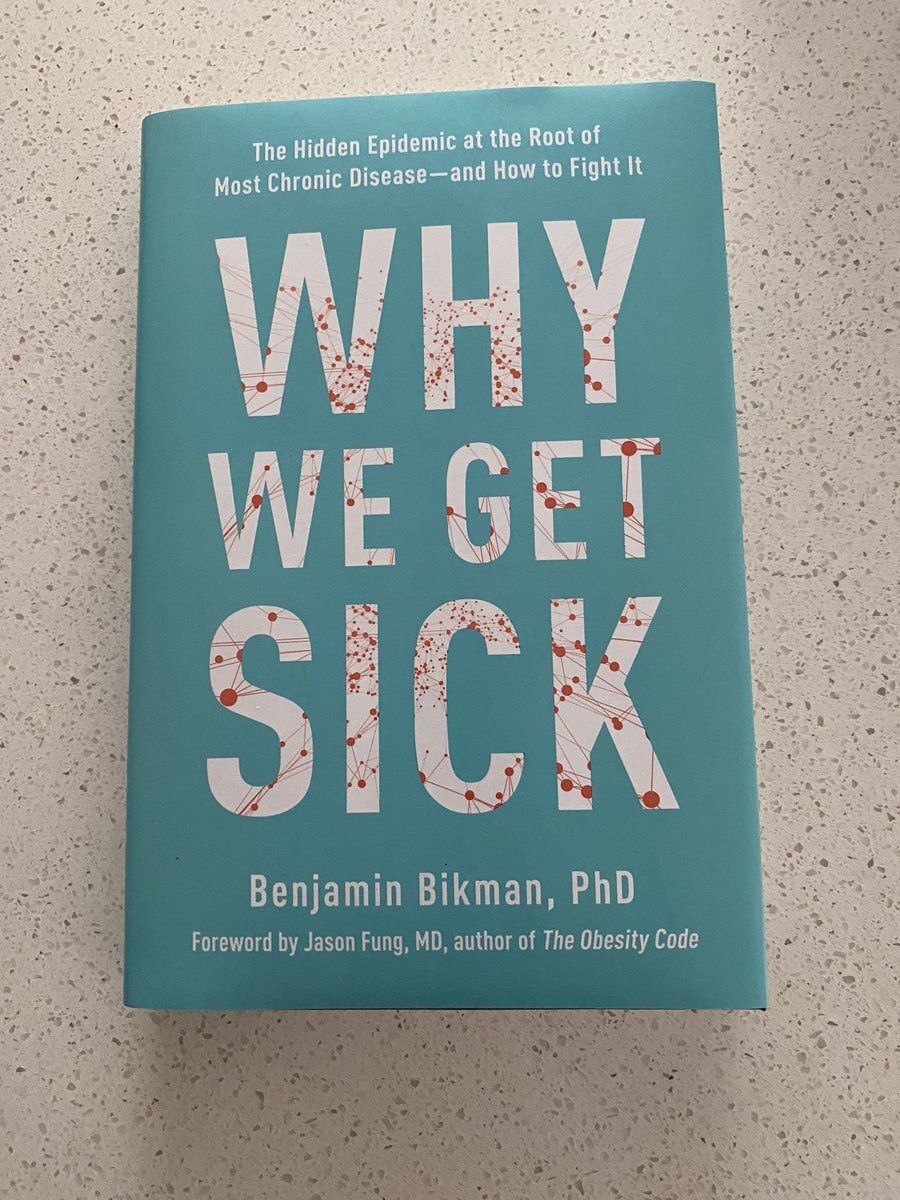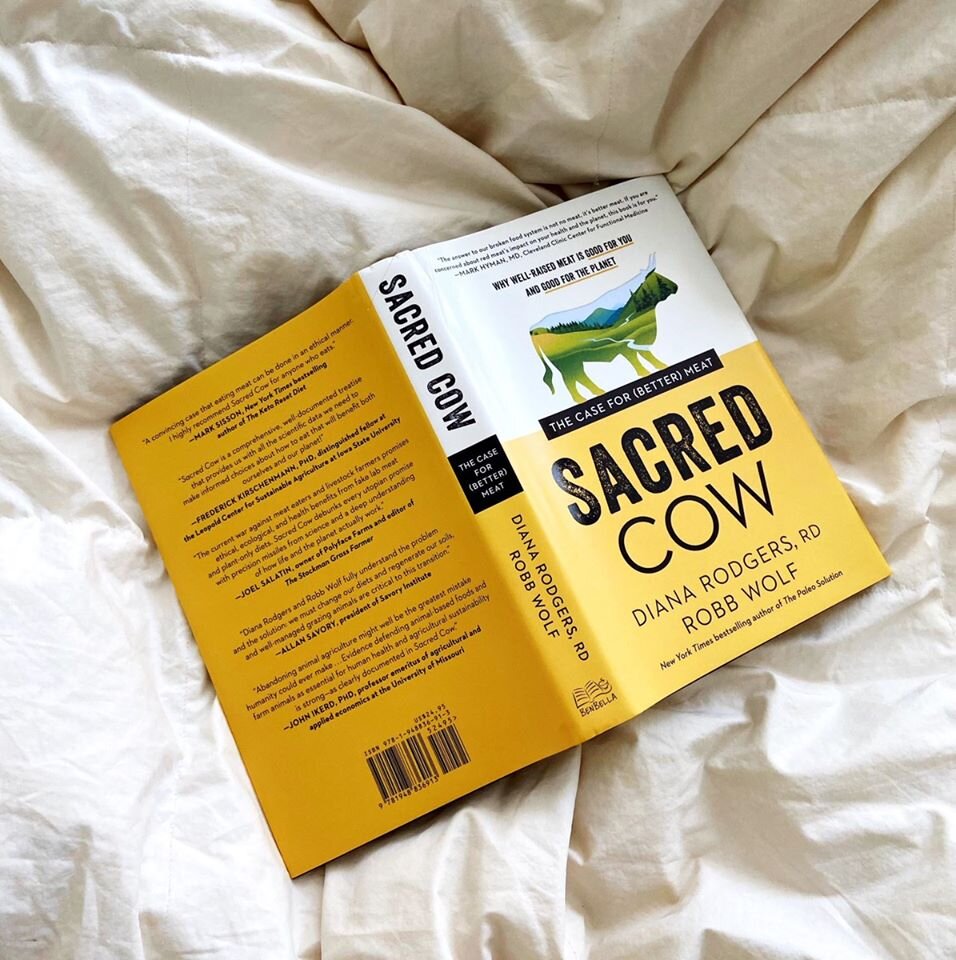book thoughts: Regenerate by Sayer Ji
TL:DR Challenging the standard of practice, pill-for-every-ill approach to healthcare, Sayer Ji dives into the history of how the modern medical establishment came to be, as well as explores the alternative to the “sickcare” system by looking into ways of optimizing health through holistic practices and functional medicine tactics, rather than managing illness.

book war: Fiber Fueled vs Fiber Menace
Fiber Fueled is written by a plant-based gastroenterologist, Fiber Menace, by a forensic nutritionist. Both hold diametrically opposed views on fiber recommendations. While Fiber Fueled praises including ever greater quantities of fiber in the diet, Fiber Menace pull no punches as to why fiver is overrated and potentially detrimental to overall health. Despite their differences, they both agree on one thing… “it is easier for our body to digest and process meat.” This is a quote from Fiber Fueled, which doesn’t give much credence to his plant-based argument, but that is a discussion for another day.
The thing everyone wants to know… how will I shit without fiber in my diet? Well, if we understand that nutrition is based on our ability to breakdown and assimilate nutrients, the simple fact that human don’t posses the digestive enzymes necessary to breakdown fiber should counter the idea that we need large amounts of fiber for regularity.
Gut motility is influenced by the content and composition of a meal, not its volume. Dense meals with high-fat content increase motility — carbs and protein have no effect. How much FIBROUS BULK you eat makes no difference because fat initiates the release of bile from the gallbladder, which then stimulates peristalsis. Pounding more fiber in hopes that it will make you shit is akin to there being traffic on the highway and thinking sending more cars down the onramp will help get things going.
That said, it is necessary for us to feed the microbes in our gut. And that is a good thing. More fiber = more diversity, but does more diversity mean better health? Fiber Fueled says yes, while Fiber Menace makes no mention (and as a fan of ancestral health, all signs point to more being better, however, I am not convinced). To get greater diversity, we need more fiber but an excess of fiber can cause greater acidity in your colon due to fermentation, which has the ability to kill off microbes.
Both books make compelling arguments fo their side, but it would be foolish to blinding accept what is being said in either, just because you want it to be true. A bit of self-experimentation is necessary to figure out where on the spectrum of fiber intake you need to be. A very simply place to start to see if you dietary plan is working or not is by utilizing the Bristol Stool Scale. If you aren’t shitting a “4” consistently, try adding or taking away some fiber for 2 weeks, depending on where you fall on the scale. Adjust accordingly.
Personally, Fiber Fueled was a waste of time because it just parrots everything you’ve already heard. “More plants, less meat.” This is dogma, and it WILL NOT work for everyone. Over the years I have ramped down my vegetable intake and have seen a rise in the quality of my digestion. When I was juicing everyday and eating grains, my body was falling apart. Fiber Fueled gets a 1 out of 5. On the other hand, Fiber Menace swings the complete opposite direction and is very refreshing to read something counterintuitive the common advice, and somehow have it vindicate my approach to a lowered fiber intake. Fiber Menace gets a 4 out of 5, and is a must read for anyone who thinks fiber is the only way to solve their digestive issues.

book summary: The Carnivore Code
TL:DR — Meat isn’t bad for you and doesn’t have to be for the planet either. Veggies may be the underlying cause of your health or digestive issues.
What is the Carnivore diet?
The Carnivore diet is what “healthy woke” people think the #Paleo diet is. To clear up any confusion, Carnivore is a way of eating in which you only consume animals (steak, fish, bone broth, steak, organ meats, steak), NO PLANTS. You can stretch that into animal products (eggs, cheese, or honey) but you’d really be blurring the lines. Paleo consists of both meat and plants.
Why would anyone only eat animals?
Because steak is delicious?! Regardless of what the “game changers” told you, animals (and everything in them) are the best concentrated source of nutrients you can find (assuming they’re humanely raised, wild caught, grass fed, free range, etc). Animals are able to extract nutrients from the plant material they eat better than humans can because of the length and structure of their digestive system. In this case, size matters! Additionally, animals have an innate intelligence that allows them to know how much of any particular plant they can eat without it making them sick, as they navigate the landscape, selecting up to 170 different grasses and twigs for daily consumption. This becomes important because all plants contain toxins, and too much of one can cause problems.
Why are plants making toxins? Can they be harmful?
Plants make toxins as a defense mechanism against being eaten because they can’t run away. In small doses they’re probably fine. There is an argument that plants are only beneficial due to the hormetic response that comes from these toxins. The problem arrises when we eat too much and get overloaded, as in consuming that same fucking kale smoothie you’ve had for the last 6 years. It's possibly doing more harm than good. If you are suffering from inflammation, digestive issues, skin problems, or autoimmune conditions, using #Carnivore as a tool for an elimination diet to see if symptoms improve might be a good idea.

book summary: Why We Get Sick
TL:DR — We get sick because we are insulin resistant. (I saved you $25)
3 out of 5
What is Insulin Resistance and Why does it matter?
One of insulin’s main roles is the regulation of blood sugar, which rises and falls throughout the day in response to our choice of food and stress load. At its simplest, if you eat sugary foods or encounter stress your blood sugar rises, because high amounts of glucose circulating in the blood are dangerous, insulin is produced to drive it into the cell for energy, or store it in fat cells for later use. If this occurrence happens too frequently, there is a reduced response to the hormone insulin. It’s like listening to your friend bitch about the same thing day after day, eventually you get tired of hearing about it and stop listening. This is bad because it can lead to high blood glucose levels, or “hyperglycemia” — the universal sign of diabetes. Even worse, with higher levels of circulating glucose and insulin, come lower levels of brain and sexual function.
What makes us Insulin Resistant in the First Place?
Too much insulin causes insulin resistance — for every 1unit increase in fasting blood insulin, a person can experience a 20% increase in resistance. When a process excessively activated, the body will dampen its response to the excess stimulus in order to reduce the activation (think antibiotics and bacteria resistance). If a cell, whether liver or muscle, is inundated with insulin, it can do nothing to directly reduce the insulin the pancreas is producing, but it can alter itself to ensure that insulin has a smaller effect; becoming resistant. As this occurs in countless cells/tissues throughout the body the prevalence of insulin resistance rises.
How to Fight Insulin Resistance?
Stop eating processed carby foods and switch to whole foods. Additionally, move your body in a way that challenges it daily. As muscle contracts, it's able to take in glucose from the blood without using insulin, reducing the burden overall. Because movement enables this insulin-independent process, our blood insulin naturally lowers during and shortly after exercise.

book summary: Sacred Cow
Sacred Cow by Diana Rodgers & Robb Wolf
4 out of 5
TL;DR Eating meat isn't killing the planet, however if we want to thrive it would BEHOOVE (get it, ha!) us to implement sustainable farming practices.
Do #vegetarians live longer than meat eaters?
No. However due to confounding factors around health, non-vegetarians are more likely to smoke or excessive drink, ultimately leading to earlier death therefore skewing results.
Are we eating too much #meat?
Our consumption has declined since the 70's — from 2.7oz per person/per day to 1.8oz as of 2016. We've made up the difference by increasing our intake of calories from sweeteners, grains & seed oils.
How much protein should we eat?
The RDA (aka MINIMUM WAGE OF #NUTRITION) states 0.8g per kg of bodyweight. This recommendation is only enough to keep you alive, not optimize your life. The AMDR (acceptable macronutrient distribution range) has a better grasp at 10-35% of calories coming from protein. Largely comes down to your goal.
Is grass-fed healthier than regular #beef?
Marginally yes. Perhaps not worth the money from a nutrient perspective, however if we look at sustainability, ethically raised meat will have less environmental impact overall.
Isn’t it possible for me to get all my nutrients from plants?
Yes, but only if you want to look like a pile of hashbrowns. Most people cannot thrive on a meatless diet because nutrients in plants are not as bioavaliable & most contain antinutrients causing multiple issues. Plus, you would get fat trying to match nutrient profiles: You'd need to eat 600 calories of beans & rice to get the same amount of protein you can get from only 160 calories of beef (3.5oz), not to mention B12 & heme iron.
Are cow farts killing the atmosphere?
No. Methane from cows is natural, whereas fossil fuels are not. Fossil fuels come from “ancient” carbon that has been locked underground for millions of years, and when extracted, adds new carbon to the atmosphere. Cows transform existing carbon, in the form of grass into methane as part of their digestive process. Methane is then farted out, broken down into H2O & CO2 molecules which are cycled back to grow more grass & the cycle continues.